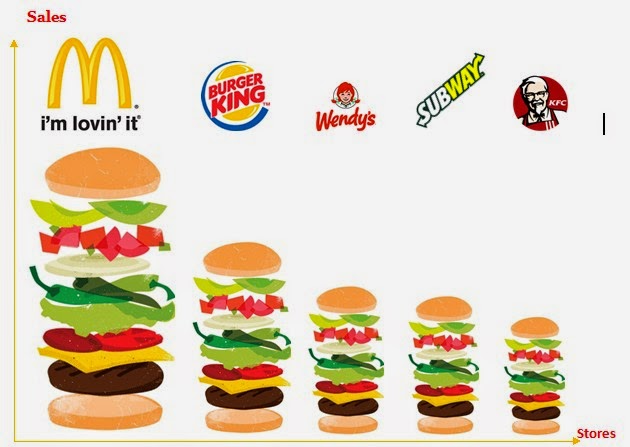The fast food industry
is huge and growing. McDonald’s, KFC, Burger King, Subway, Domino’s Pizza are
certain names that pop out in everyone’s mind when they talk about fast-food. But
McDonald’s is the one that has maximum market share sales. McDonald’s is the
world’s largest chain of hamburger fast food restaurants, serving around 68
million customers daily in 119 countries across 35,000 outlets. A McDonald’s
restaurant is operated by either a franchisee, an affiliate, or the corporation
itself. McDonald’s Corporation revenues come from the rent, royalties, and fees
paid by the franchisees, as well as the salad in company-operated restaurants.
McDonald’s primarily sells hamburgers, cheeseburgers, chicken, french fries,
breakfast items, soft drinks, milkshakes, and deserts. In response to changing
consumer tastes, the company has expanded its menu to include salads, fish,
wraps, smoothies, fruit, and seasoned fries. The company focuses on marketing
strategies that effectively attract a wide variety of people. They especially
appeal to children in hopes that they will become lifelong customers.
A good way to analyze
the strategies is by using the Porter five forces competitive model. The model helps to analyse the industry condition and helps to decide if one should enter an industry. Furthermore, it helps an existing firm to take measures to find their shortcomings and work on them.
Rivalry
among the existing companies in the industry
The fast food industry
is very competitive and dynamic. McDonald’s has many competitors here. The top
are Burger King, KFC, Wendy’s, Yum, Subway, etc. Though McDonald’s has achieved
to have the maximum sales and market share, but to exist in such a competitive
industry, they are always making new moves and trying to differentiate their
product. McDonald’s has differentiated their product by keeping the price lower
than their competitors. They are always trying to bring out new items or
promotions as the high level of competition results in copying the ideas.
So we can conclude the
rivalry among the existing companies in the industry is very high.

Threat of new entrants
McDonald’s and other existing big companies have set certain entry barriers for the new entrant in the fast-food industry. As for McDonald’s, it has the economies of scale, brand image, 35000 restaurants worldwide- which made the entry of new companies really hard. Other than this, McDonald’s low price and operations in Wal-Mart’s and sports stadiums have also created entry barriers.
So, we can say the threat of new entrant for McDonald’s is quite low.
Threat of substitutes
So, the threat of substitute for McDonald's is moderate.
Bargaining power of
customers
The fast food industry
has a huge number of customers. McDonald’s relies on a strong customer base. It
is very important to know about the customer’s demands and expectation. So far,
McDonald’s has differentiated their product by low price. But if their price
increases or other companies lower their price, McDonald’s might lose their
customer base. There are similar products in the market, the buyer’s cost is
low and also the customer’s are becoming health conscious, which are threats
for McDonald’s. They have started offering salads and changed their oil to
healthier substitute as a result of consumer’s health consciousness.
So, bargaining power of customers of McDonald's are pretty high.
Bargaining
power of suppliers
Based on the good relationship that McDonald's has with the suppliers, the bargaining power is fairly stable currently. Being in the industry for such a long time and being such a big corporation, both McDonald's and their suppliers rely on each other. McDonald's has a good supply chain of quality materials at fair prices and suppliers are surely content with supplying to a large consuming company such as McDonald's.
So, bargaining power of suppliers is moderately low for McDonald's.
References:
http://misznina17.blogspot.com/2008/12/porters-competetive-forces-model-on.html


















